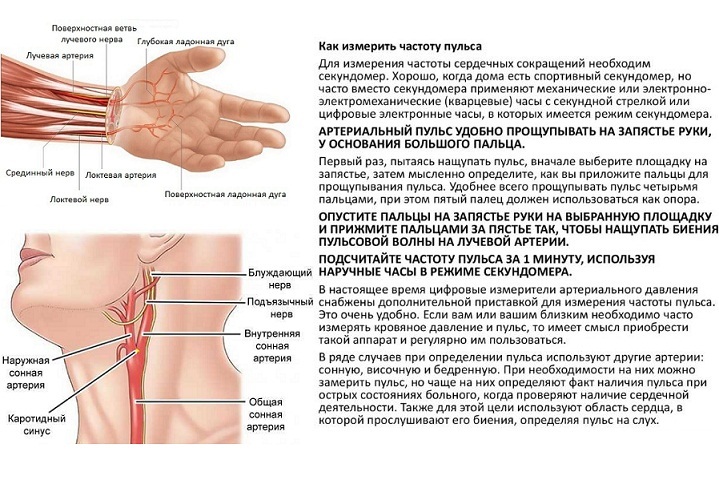In this article, we will study the important characteristics of the heart of the heart - its pulse with a frequency of 80 beats per minute.
Content
- Pulse 80 beats per minute - is it normal: how to check what the norm indicators are?
- Pulse 80 beats: Reasons - when is it time for the alarm?
- How to quickly reduce the pulse of 80 beats at home?
- How to treat an increased pulse of 80 beats: prevention measures
- Video: pulse 80 beats - the norm or an occasion to worry?
The pulse is a mirror reflection of the work of the heart itself. That is, this is the frequency of narrowing of the walls of the arteries for heart contractions or blows. Each age and sexual group has its own norms. Therefore, the pulse of 80 beats cannot specifically speak for increased or increased indicators, because each has its own norms, which largely depends on the lifestyle. The number of blows 80 is the maximum medical limit. But is it so dangerous and what to do in this case, we will find out in this article.
Pulse 80 beats per minute - is it normal: how to check what the norm indicators are?
It is worth noting immediately why the pulse of 80 beats is concerned. Recall that heart rate (heart rate) should be similar to the number of pulse blows. And the higher the number of these contractions, the higher the load on the heart. But at the same time, more blood should not have to be pumped.
Important: the heart grows with a person, and also increases from regular physical exercises. And a large heart makes significantly less abbreviations to pump the same amount of blood as a person without physical preparation and with an increased pulse. For this reason, children have a slightly higher norm than an adult! Also do not forget that with age the frequency grows due to wear of the heart. Therefore, the verdict is this - the lower the pulse, the better!
You can calculate the number of arterial strikes or the pulse frequency (emergency) at home yourself:
- on the wrist of the left or right hand, in the area of \u200b\u200bthe radial artery. At the same time, choose a place under the bend of the brush in a conditionally divided half on the left. That is, under the thumb
- you can measure According to the elbow artery, also on the wrist, but already on the right, conditionally under the little finger
- straightaway At the beginning of the armpit on the axillary artery, on the lateral wall zone
- a reliable and simple way to measure the pulse According to the carotid artery, The so -called carotid pulse. A stronger blow is felt on the left side, but you can measure on the right on the neck. To do this, we apply the fingers of the fingers immediately under the skutle.

It is worth noting that many take such measurements at home with the help of a thumb. But this is not entirely correct - the chance of incorrect counting increases. Therefore, to determine the pulse, we use the pads of the thumb and middle fingers, and even better - along with the ring.
Important: ideally, the calculation is carried out throughout the minute, that is, 60 seconds. But techniques are allowed when there is an account of 30 seconds with multiplication of 2, or when they are considered only 15 seconds with subsequent multiplication by 4.
What are the indicators of the norm?
Even when we rest, our heart continues to work. It is important to understand that there are many factors that affect your pulse, for example, age, weight and even life situations. And what is good for one can become fatal for the other.

As we see from the table, The average value of an adult should not exceed the limit of 70-75. At the same time, the heart rate can be judged by the proper operation of the cardiovascular system. As well as A healthy person with a low pulse lives much longer than those who have a high frequency. After all, the heart wears out to a lesser extent. Therefore, if you have a pulse of 80 beats per minute in a calm state, then this is already considered an overstated indication! But do not forget for other factors that affect such a norm. By the way, we do not forget that there should not be a low pulse either - the minimum permissible limit is up to 50 strokes!
Pulse 80 beats: Reasons - when is it time for the alarm?
- The first rule is why you can have a pulse of 80 beats is Disorders during measurement. Before measurement, you should sit or lie calmly for several minutes, without moving or talking. Thus, the heartbeat can slow down to relax. Optimally, the measurement is carried out in the morning before getting up.
- In healthy people, the heart rate falls at night, When the body switches to sleep mode and uses less blood. On the other hand, a weak heart does not calm down at night and continues to beat 80 times per minute. Low fixed impulse modulation is associated with an increased risk of heart attack and sudden heart death. This is often found in diabetics.
- People suffering from stress, which are on the verge of burnout, often have such a pathological variability of heart rhythm with a high and fixed pulse. If you are at rest and your pulse is 80 strokes, then you should deal with your health.
But where a dangerous signal is the discrepancy between the heart rate with heart contractions. Therefore, measure your pulse not only at rest, but also after physical activity. If the pulse is of lower value, then this indicates a pulse deficiency. But the overestimated indications, for example, heart rate - 70, and you have a pulse - 80 beats, then this is already a rapid pulse.
By the way, we suggest you read our article on heart rate standards and measures to reduce their frequency: "What to do if the heart beats often and strongly: what are the norms of heart contractions?"
When the pulse of 80 beats is dangerous or at risk falls:
- athletes, that they should have a pulse of no more than 70 beats
- elderly people
- as well as people suffering from bradycardia- Reduced heart tone. For them, the norm is considered to be sluggish and slow work of the heart, which means that the pulsation itself
For all the rest, the pulse of 80 beats is not a critical indicator, although many health workers consider it high, as if at the limit. But it is worth considering the discrepancy with the heart rate and other indicators of your body.

- The following factors can affect the pulse of up to 80 beats:
- high blood pressure
- taking tonic drugs or some medications
- incorrect lifestyle or taking narcotic drugs
- stressful situations on an ongoing basis
- chronic diseases
- If you have health and pressure, then the inflated frequency can be shown such aspects:
- excessive physical activity on the eve
- binge eating
- preliminary consumption of alcohol, especially in large doses
- smoking
- hot weather or temperature in the house
- experiences in recent times
- But dangerous harbingers should be attributed:
- anemia
- respiratory system diseases
- chills or fever on the background of fever
- endocrine disorders
- infectious foci and infections
Important: each increase in heart rate at rest above 70 increases the risk of vascular and heart disease, and can also cause early death. If you notice a sharp leap from normal testimonies that are familiar to you, then this is an occasion to visit the therapist.
But at the same time, strong fluctuations between the load and the rest are positive. After all, the larger the range between the rest of the rest and the load, the greater the supply. It is important that the heart can adapt well to stressful situations. Doctors talk about impulse modulation. If the pulse frequency does not increase so much under physical stress, then the autonomic nervous system that should hold the heart in balance is under attack.

How to quickly reduce the pulse of 80 beats at home?
If the pulse of 80 beats for you is not considered the norm and arose spontaneously, then it is worth performing a number of some actions:
- Stop temporarily physical or any other work
- Unflap the collar or weaken the clothes in the neck
- Take a convenient position and try to relax
- Drink a sedative or hour with chamomile, lemon balm, mint and honey, as well as blackcurrant
- If you feel that the general condition is deteriorating, then it is worth calling a doctor. Symptoms such as chest pain, severe dizziness, numbness of the fingers and panic include emergency situations.
The pulse of 80 beats is not a critical limit to take medicines!
If necessary, the doctor may prescribe drugs to reduce the pulse. Usually used beta-blockers and calcium antagonists are used. They act differently in the blood vessels and the heart, thereby contributing to a decrease in heart rate and blood pressure.
As a rule, they are used mainly in patients with arterial hypertension and concomitant high pulse. In people with high blood pressure and normal pulse frequency, the heart rate from these drugs can drop sharply. Preparations of both groups are rarely prescribed only to reduce heart rate.

How to treat an increased pulse of 80 beats: prevention measures
If the pulse of 80 beats is high for you or is at a constant level, but there are no sharp jumps, then you can simply reconsider your mode.
- Exercise more and walk daily in the fresh air. Your heart will beat faster during activity. Regular physical exercises gradually slow down the heart rate at rest.
- Stress should be less- Try meditation, relaxation or other methods of removing stress to help reduce the heart rate at rest
- Avoid smoking After all, tobacco products increase heart rate. Therefore, its reduction can help improve the absorption of oxygen and the state of health of your heart
- Lose weight if necessary. The larger the body, the more the heart should work to supply it with blood. Weight loss can help slow down the heart rate
- Run at least 3 times a week and at least 30 minutes. This is one of the most effective methods of training your heart. But you do not need to bring yourself to exhaustion - do the load gradually!
- Drink a minimum of 1-1.5 l of water per day. Often dehydration of the body gives such a signal
- Rest and sleep at least 7-8 hours. Do not forget that overwork is far from the last cause of the rapid pulse

- Follow your nutrition, as well as the reception of proper vitamins. By the way, they can be obtained from food. But we include in our diet:
- potassium, which protects against increasing pressure and heart attack
- magnesium, which contributes to the maintenance of potassium -level and regulates cardiac rhythms
- ascorbic acid or vitamin C for elasticity and strengthening blood vessels
- selenium,which prevents the blockage of blood vessels
- chromium To reduce the ischemic threat to the heart
- coenzym Q10 for energy charging
- Omega 3, as an indispensable storehouse for the work of the heart and trunk vessels
Even if the pulse of 80 beats per minute for you and your body is the norm, do not neglect the signals of the body to visit the doctor. Even a small adjustment in the mode will help improve not only the frequency of your pulse, but also the overall well -being. The rejection of bad habits and food will only add strength and energy! Take care of yourself and your body!







